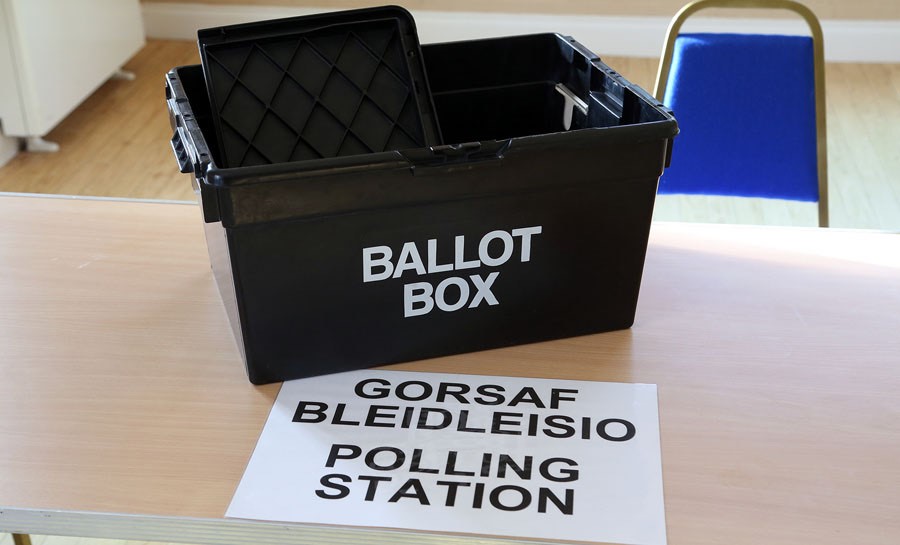Politics
M4 variable speed limit will be enforced
 DRIVERS that flout the Variable Speed Limit restrictions in place along a busy stretch of the M4 around Newport will face tougher enforcement action, says Economy and Infrastructure Secretary, Ken Skates.
DRIVERS that flout the Variable Speed Limit restrictions in place along a busy stretch of the M4 around Newport will face tougher enforcement action, says Economy and Infrastructure Secretary, Ken Skates.
The warning was issued ahead of a new safety campaign launched Wednesday (25 July) which aims to ensure drivers are more aware of and adhere to the variable speed limits in place on the M4 between Junctions 24 (Coldra) and 28 (Tredegar Park) before enforcement action is stepped up.
The Welsh Government introduced a Variable Speed Limit along this stretch of road in 2011 as a means of reducing congestion and improving safety and journey time reliability.
Infrastructure and technology installed along the motorway between Junctions 24 and 28 monitors traffic flow and calculates the optimum speed limits for current traffic volumes. The limits are lawfully displayed on the electronic Visual Message Signs [VMS] above lanes and at the sides of the road.
When vehicles travel at consistent and similar speeds, journey times become more predictable. Congestion and queuing is reduced as traffic continues to flow steadily and the risk of collisions from vehicles approaching the back of queues is lessened.
Ken Skates explained: “Since its launch the scheme has helped to improve traffic flow and reduce the number of collisions along this stretch, with the majority of drivers adhering to the limits in place.
“However, a minority of drivers continue to flout the displayed limits and act as if the restrictions do not apply to them so it is these motorists we are primarily targeting with this awareness campaign and subsequent enforcement action.”
The campaign is being led by GoSafe, Wales’ Road Casualty Reduction Partnership, and it will consist of two stages.
Phase one will focus on an education and awareness drive, to alert motorists that tougher enforcement will shortly be coming into effect. It will include publication of the number of offences captured on that stretch of motorway and a grace period for drivers during which those who exceed the stated limit will receive warning notices.
The second phase will focus on enforcement and those caught exceeding the speed limit displayed will be issued with a Notice of Intended Prosecution.
GoSafe Partnership Manager, Chris Hume, adding his support to the initiative, said: “Managing the speed of traffic through this busy section of the M4 Motorway is vital, and proactive enforcement of the variable speed limit assists GoSafe in achieving its strategic goal to make people safer on Welsh roads by reducing casualties and saving lives.”
The Cabinet Secretary added: “There is always room for improvement in road safety and everyone has a responsibility for improving safety and playing their part. The M4 variable speed limit is just one element of a multifaceted approach the Welsh Government takes to improving road safety on the motorway and trunk road network as a whole.”
News
Return your postal vote and make your voice count

POSTAL votes for the upcoming Police and Crime Commissioner election can be returned as soon as received.
Those registered should have received their postal vote information and now is the time to fill it in and pop it back in the post.
You must complete the postal voting statement and your ballot paper for your vote to be counted.
Your postal vote pack includes full instructions on how to complete the form and voting ballot.
There will be two envelopes – complete the postal voting statement and include your ballot paper in envelope A before placing that in envelope B, ensuring the freepost return address is visible.
This helpful YouTube video shows how to complete the postal vote documents.
If you need help with your postal vote form you can also call 01437 775844
There are some changes to postal vote submission and you will need to complete a form with our staff if you decide to hand your postal vote in to a polling station or County Hall reception.
News
Transport Secretary champions 20mph speed limit changes in Wales

IN a recent address to the Senedd, Cabinet Secretary Ken Skates unveiled a comprehensive three-phase plan aimed at refining the implementation of 20mph speed limits across Wales. This initiative is part of a broader effort to enhance road safety in residential areas, particularly near schools, hospitals, and other sensitive sites.
Skates emphasised the Welsh Government’s commitment to incorporating the views of Welsh citizens directly into the decision-making process. “We’ve started by listening,” Skates stated, underscoring that the voice of the community is pivotal to the transport policy development. The approach includes a significant public engagement campaign set to run until July, where feedback will be sought from a diverse group of stakeholders including bus drivers, emergency service personnel, businesses, and local council representatives.
The Welsh Government plans to work in close collaboration with local authorities to assess and prepare for the proposed changes. This preparation will involve revising guidelines to determine which local roads might be exempt from the new speed limit, with an updated version expected to be published in July. Following this, councils will initiate detailed consultations from September to ensure community needs are fully addressed.
The phases of the plan as outlined by Skates include:
- A robust national listening programme to gather input on road safety concerns from across the community.
- A partnership with local authorities to prepare for the changes, encouraging public participation in identifying areas where the 20mph limit should be applied.
- Implementation of the changes on the ground, with local authorities adjusting speed limits in accordance with new guidelines and community feedback.
The Cabinet Secretary reiterated the primary aim of the policy: “The principal objective is to save lives and reduce casualties on our roads. We continue to believe 20mph is the right speed limit in key community areas, and what I am doing now is listening to what people want for the roads in their communities, and pressing ahead with refining the policy.”
Skates also made it clear that the final decision on the extent of change would not solely rest with the Welsh Government but would significantly depend on the input from local authorities and the public. Information on how residents can participate in this consultation process will be provided on the Welsh Government’s website, ensuring that all community voices can contribute to shaping the future of their local transport policies.
Responding to a press release from Labour’s Cabinet Secretary for Transport, Natasha Asghar MS, Shadow Transport Minister, said: “Whilst I am waiting with bated breath to hear the Cabinet Secretary outline his transport priorities, I fear all this talk of changes to the government’s flawed 20mph scheme is just another example of Labour ministers paying lip service.
“Ministers might be making all of the right noises on 20mph, but if the Cabinet Secretary is serious about listening to the people of Wales, then he will accept that this law was a terrible mistake and repeal it.
“Only the Welsh Conservatives would scrap this disastrous law and get Wales moving.”
News
NRW issues new enforcement notice at Withyhedge

NATURAL Resources Wales (NRW) has taken further enforcement action at Withyhedge Landfill in Pembrokeshire, setting out the urgent steps its operators must take to address the site’s ongoing odour and landfill gas emission issues.
NRW has issued site operators Resources Management UK Ltd (RML) with a further Regulation 36 Enforcement Notice, which requires the operator to deliver a series of actions by specified deadlines – the first due to be achieved by April 21.
The actions include implementing measures relating to gas management infrastructure, further capping areas of the site, and improving interim cover arrangements as the work progresses.
Each step outlined in the Notice must be completed by May 14.
However, the Notice stipulates that most works must be completed before May 8.
The measures are intended to address the odour issues experienced by communities surrounding the site.
Although actions set out in the Section 36 Notice issued in February to prepare and cap a waste cell and install gas infrastructure to contain and collect landfill gases appear to have been completed, the site operator has identified further areas of the site which could be causing problems.
RML submitted their plans to resolve these issues last week.
The proposed solutions informed the actions included in a new S36 notice issued last week.
The new enforcement activity requires the operator to deliver the additional steps they need to take.
If the actions outlined in this new Notice are not complied with, NRW will not hesitate to take further action. The Welsh Government agency will consider all the regulatory tools available, including issuing a Section 37 suspension notice.
A Section 37 Notice would end operations at Withyhedge
Huwel Manley, Head of South West Operations, NRW, said: “NRW is taking additional enforcement action to ensure RML Ltd. takes the urgent action they have identified needed to control the odour issues at Withyhedge Landfill.
“We fully understand the growing discontent from the affected communities, and we feel that it is unacceptable for residents and visitors to the area to continue to be affected by these odour and landfill gas emissions.
“We want to reassure everyone that we are committed to ensuring RML Ltd. deliver the actions they have identified and that they work quickly to resolve this issue.
“While the pressing work required by the operator progresses over the coming days and weeks, the site remains under investigation, and we will continue our regulatory presence.
“Nothing is off the table. If the series of actions required in this Notice are not complied with, we will have no hesitation to take further enforcement action, considering every option available to us under the regulations, including suspending the environmental permit if appropriate.”
Will Bramble, Pembrokeshire County Council Chief Executive, said: “We are extremely disappointed that RML, the company managing the Withyhedge landfill site, has not delivered the necessary action to stop the completely unacceptable odour emissions.
“We fully support NRW’s additional enforcement action and continue to work closely with them to correct the situation.
“We also support NRW’s intent to take further action should it fail to meet the May 14 deadline, including considering suspending the permit.
“Geotechnology is monitoring under the direction of the air quality cell and liaising directly with residents affected.
“We will ensure the data is made available to the public at the earliest opportunity.”
The controversy over £200,000 in donations to Vaughan Gething’s Labour leadership campaign by companies linked to Withyhedge and a further substantial personal donation by company director David Neal continues to dog Wales’s new First Minister.
As revelations continue to bubble up from under the cap that Mr Gething has tried placing on them, the smell from Withyhedge has reached Cardiff Bay. It is beginning to stink out the Senedd.
More details of that story are elsewhere in this week’s Herald.
NRW requests that instances of odour from the landfill continue to be reported via this dedicated form: https://bit.ly/reportasmellwithyhedge.
-

 News6 days ago
News6 days agoPolice issue update on the search for Luke, missing from Pembroke Dock
-

 News19 hours ago
News19 hours agoPolice and air ambulances at ‘serious incident’ at West Wales school
-

 Sport6 days ago
Sport6 days agoHerbrandston Clinch Promotion to Division One
-

 News5 days ago
News5 days ago20mph U-turn: Some roads will return to 30mph following public outcry
-

 Community5 days ago
Community5 days agoMiracle pup finds her forever home after heart-wrenching journey
-

 Community2 days ago
Community2 days agoCounty Hall to offer space for community banking
-

 Crime3 days ago
Crime3 days agoBrian Davis: Wanted on suspicion of commercial burglary
-

 Crime18 hours ago
Crime18 hours agoPembrokeshire pensioner accused of 17 sexual offences against children























